NIAGARA FALLS, Ont. – The Canadian Cattlemen’s Association is planning some organizational changes that will make it more active but also cost producers in Alberta, Saskatchewan and Ontario more money.
At the CCA semi-annual national meeting last week in Niagara Falls, Ont., board members agreed the organization must evolve if it is to better represent an industry facing crises like BSE. They agreed the current organization does not reflect an industry that has moved from national self-sufficiency two decades ago to being the world’s third largest beef exporter.
Read Also

Breaking down successful winter feeding into six steps
It’s that time of year when it is important to start planning for a cow herd’s winter feeding program. Here are six steps I think are necessary to consider when getting your feed tested.
“It really is a case of the organization not keeping up to the change in the industry,” CCA president Hugh Lynch-Staunton said Aug. 20. “We will make some changes and consider others before our March meeting.”
The changes agreed to in Niagara Falls will see the association’s committees on trade, environment, domestic policy, animal health, beef quality and finance become more active and meet more regularly.
Lynch-Staunton estimated that extra meeting costs for CCA committees could add up to $20,000 per year for each committee, or more than $100,000 in annual costs for the national organization.
At least initially, he said producer organizations in Alberta, Saskatchewan and Ontario will use check-off funds to pay the higher costs.
“They have seen a need for a higher level of activity nationally and internationally in areas where we haven’t been diligent enough since BSE,” said the CCA president.
“I think producers in these three provinces are prepared to move forward and carry this thing until the rest of the provinces can or are willing to contribute as well.”
Meanwhile, CCA provincial members are wrestling with questions about whether the structure of the organization gives disproportionate say to provinces with smaller sectors.
There have been some rumblings from western affiliates that despite the fact their members took the greatest BSE hit, their voice was diluted by opinions from regions less affected.
“A couple of the provinces or segments during the BSE crisis felt they didn’t have the impact they felt they deserved,” Lynch-Staunton said. “We are looking at how to correct that.”
The Alberta rancher, in his first year as CCA president, also suggested that while there are some regional or provincial tensions, the national industry has managed so far to work out its differences.
“Some people right across the country feel sorry for themselves, maybe some more than others,” he said. “Our structure is really a compromise of all these interests and so far it has worked pretty well.”
But Lynch-Staunton said despite the past success, the CCA must change because the BSE crisis showed committees were too inactive and designated leaders were too much on the front line.
“We found that the key players had to go through heroics and would be totally exhausted at the end of it,” said the CCA president.
“We have to find a way to reorganize at the highest levels so that that doesn’t happen again and we will be better prepared for the next crisis.”














